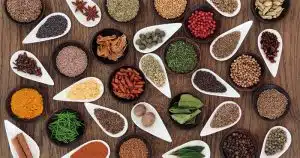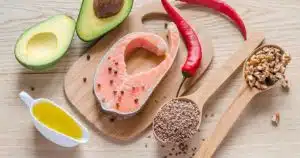Over the last couple of months, as I have continued my exploration of the benefits of nutrition for Polycystic Ovarian Syndrome, I have become increasingly aware of the importance of our gut health. Our intestinal flora have a far and wide-reaching impact on our health and I have wondered about it’s impact on our PCOS. So, I am asking the question, “PCOS and probiotics? Should probiotics be part of my PCOS Diet?”
Your Gut Health
You may be surprised to hear that the micro-organisms that live in your gastrointestinal tract weigh 1kg and outnumber your cells by 10-1. So, it’s easy to see that they would have a huge impact on your overall health and well being.
The composition of the bacteria, yeasts and other organisms in your gut depends on your diet, exposure to chemicals and antibiotics. It also changes from person to person and will change during your lifetime. The goal is to increase the friendly organisms and decrease the not so friendly ones that promote disease and illness(1).
Why You Should Care for your Gut
The microflora in our guts have a huge role to play in so many aspects of our health. Here are some of the things that they do for us(2):
- Produce B vitamins, including Biotin and Folic acid (I have heard of many women taking Biotin to help alleviate hair loss)
- Increase absorption of minerals, including calcium, iron, magnesium and manganese
- Break down and rebuild hormones
- Promote healthy weight and metabolism
- Help control inflammation
So, our gut microflora have a pretty important job and it’s important to look after them. Let’s have a look at PCOS in particular.
Probiotics for PCOS?
Inflammation and Obesity
We know that women with PCOS suffer from chronic inflammation which impacts on insulin resistance and weight gain. But did you know that our intestinal flora mediate this inflammatory process? In one piece of research, it was found that changes in gut flora resulted in decreases in body fat, weight gain and inflammation (3).
The other problem is that this chronic inflammation causes the gut to allow unhelpful substances into the body (leaky gut) which leads to more inflammation and food sensitivities. So, it’s a vicious cycle that ultimately leads to insulin resistance and worsening of our PCOS symptoms (2).
Depression

One study even found that depressed mice who were separated from their mothers and then given a probiotic returned to their previously sunny disposition. Another study found that people who had a probiotic for 30 days were more able to deal with stress (4) . Scientists are seriously looking into probiotics as a possible treatment for depression. Given the link between PCOS and depression, I’d seriously consider taking probiotics for that reason alone.
General Health Benefits
We all know too well the carb cravings that go hand-in-hand with PCOS. And we’ve all given into them at some time. Well, highly processed and refined carbs stimulate the growth of the harmful bacteria in our digestive tracts. These harmful bacteria will crowd out the good organisms and stop them from doing their work.
So, taking a probiotic or eating foods rich in probiotics will help to restore the balance and improve our overall health.
How to Take Probiotics
There are a number of ways to take probiotics.
Probiotic Supplements
You can take probiotic supplements. Here are a couple of things to consider:
- Keep them in the fridge (remember, these are live organisms and you should treat them with care).
- Take them on an empty stomach as eating them with food will increase the acidity of the stomach which is likely to kill them before they reach their final destination – the small intestine.
Fermented Foods

I have also received loads of cabbage with my weekly vegetables recently so I have been making sauerkraut. Sauerkraut is one of the best probiotic foods available and it is really easy to make. Try this recipe from Wellness Mama.
Although there are live cultures in yoghurt, there is also IGF-1 which mimics insulin and will lead to a rise in testosterone, making your PCOS worse. So, I prefer to get my probiotics from non-dairy sources of fermented foods.
Summing it Up
I am by no means saying that probiotics are going to cure your PCOS or even make a huge difference on their own. But I do think that incorporating more probiotics into your PCOS diet could make a difference to your overall symptoms, as well as improve your mood and possibly even your fertility.
If you have dabbled in the world of fermented foods or probiotics, please get in touch and let me know! I’m always keen to hear about what you are doing to manage your PCOS.
- sustainable pcos weight loss strategies
- Over 5500 women have done it and seen results
- [bonus] Done for you pcos meal plans
- [bonus] intermittent fasting for pcos course
- [BONUS] personalised nutrition plan
JOIN OVER 5,500 OTHERS








